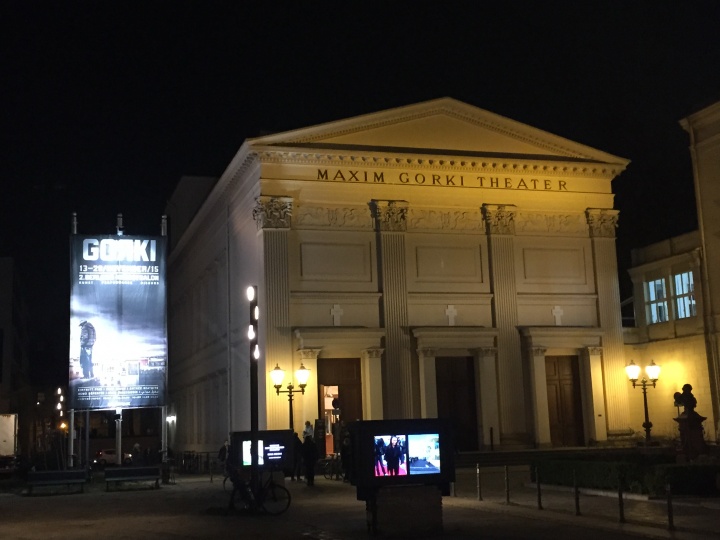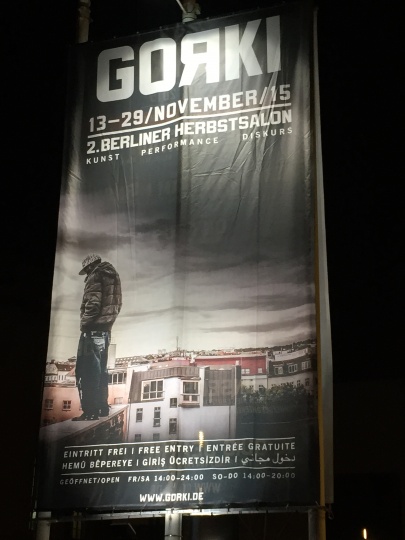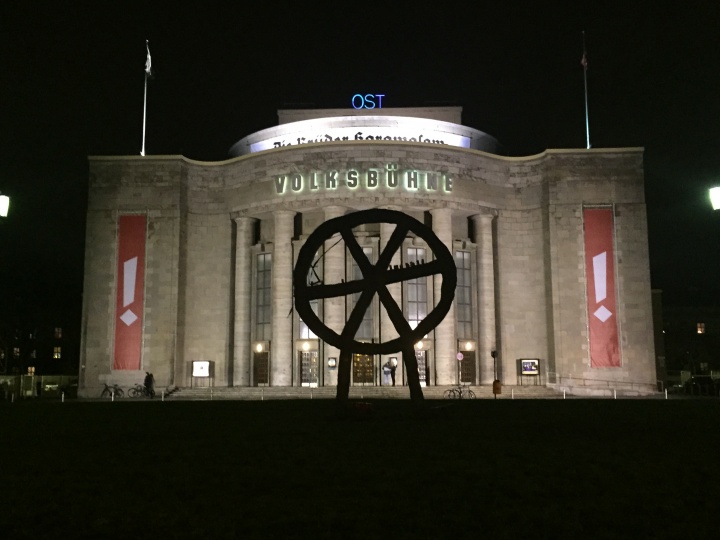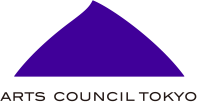2015/12/18
On "The Public": From Berlin
Board member of Arts Council Tokyo / Professor, Graduate School of Arts and Sciences, University of Tokyo
Tadashi Uchino
Having been granted a sabbatical by my employer, I’ve been living in Berlin since August 2015, intending to stay for six months as a researcher with the “Interweaving Performance Cultures” International Research Center at the Free University of Berlin.
Berlin is renowned for its rich breadth of activities covering a wide range of musical, artistic, and theatrical genres; many of these are considered “public” and receive government support. Since my own area of specialization is the performing arts, I go to the theater almost nightly; I feel I’ve not only been given an opportunity to think about the individual works performed but also compelled to consider the nature of the public and of support for the arts.
A little more than three months after my arrival, amid deepening signs of approaching winter, the Really Useful Theater festival was held at a theatrical space called Sophiensaele from 19 to 21 November. This international event included lectures, a symposium, and performances, but I was most interested in the symposium, which invited artists and activists from within and beyond Germany’s borders and in which the Free University of Berlin also took part. Titled “Really Useful Theater: An International Perspective”, it’s unsigned statement of purpose read:
The political instrumentalization of art or theatre is rarely discussed internationally with the same intensity as in Germany. This is in part because here, financial support for artistic work without a social component is rare. As a result, artists develop creative strategies for dealing with these constraints. These range from the relatively faithful realization of a social mandate to subversive reversals of the intended societal duty. International artists will discuss in a plenary session and present their projects, concepts and strategies during table dialogues.
(Really Useful Theater)
Those invited to the symposium included artists and researchers with long histories of working collaboratively with the socially vulnerable in countries around the world such as Mexico, Palestine, Kyrgyzstan, Zimbabwe, and Greece. Although it may seem slightly counter-intuitive, what interested me the most when I saw the statement of purpose was the part noting that “financial support for artistic work without a social component is rare” in Germany. The nature of the “social” in “social component” is rather vague, but presumably the statement could be more directly rephrased to say that funding is unavailable for works that are merely entertainment. At the same time, the statement also notes that this leads artists in Germany to think strategically. While “the…faithful realization of a social mandate” is easy enough to understand, what are “subversive reversals of the intended societal duty”? As anyone familiar with German theater would probably understand immediately, this can be understood to mean upending the norms or values that are thought to be held (or are thought ought to be held) in common by members of the state or civil society or other such community. In other words, it means the sort of art that critically confronts mainstream (dominant) aspects of society or presents alternative visions.
A moment ago I wrote about people “familiar with German theater.” Many readers may not, however, so I would like to introduce a few specific examples that I have witnessed myself in the hope that they might provide an opportunity for thinking about the nature of the public and of support for the arts in Germany.
As has been reported even in Japan, people fleeing Syria have been pouring into Germany and the rest of the EU since this summer. Although this mass evacuation or movement did not, of course, just begin one day all of the sudden, the dramatic rise in numbers has still led to a variety of problems concerning their passage and acceptance in many areas and particularly in border regions. Chancellor Merkel declared that Germany would actively welcome “refugees,” and here in Berlin, despite being geographically removed from the main routes of movement, as of October 20,000 to 30,000 people have already arrived this year, with the numbers expected to rise.
And so it was that one of Berlin’s major public theaters, the Maxim Gorki Theater (see Photo 1), held the 2. Berliner Herbstsalon (2nd Berlin Autumn Salon) from 13 to 29 November on the theme of immigration and refugees. As you can see in Photo 2, the event drew lively crowds not only with works for the stage but also with daily exhibitions, lectures, debates, and symposiums. The theater is known for attracting a younger audience since Turkey-born Shermin Langhoff’s appointment as artistic director in 2013, and has staged performances such as “Letters Home” by Refugee Club Impulse, a troupe made of immigrants/refugees—mostly from the Middle East—now living in Germany; “In unserem Namen (directed by Sebastian Nübling),” which invited professional actors mostly from the Middle East; and “The Situation” by Yael Ronen, Israel-born and living in Berlin, with an ensemble cast.

Photo 1: Exterior of the Maxim Gorki Theater (Photo by the author)

Photo 2: Outdoor banner for the 2. Berliner Herbstsalon at the theater reads Kunst, Performance, Diskurs [Art, Performance, Discourse] (Photo by the author)
In “Letters Home,” the performers—immigrants/refugees themselves—string together a series of sketch-like scenes based on their own experiences that critically confront just how deeply rooted discrimination against immigrants is in Germany—particularly immigrants from the Middle East and including, of course, discrimination that is unconscious and born of good intentions. “In unserem Namen,” meanwhile, uses actors primarily invited from the Middle East to address the theme of “tolerance toward others”; its first half is based on a Greek tragedy by Aeschylus and a text by Elfriede Jelinek (the Nobel laureate well known in Japan as well) while its second half incorporates transcripts from the testimony of experts given at public hearings held prior to this year’s revision of Germany’s immigration laws. I was particularly struck by the removal of the fixed seating of the classical proscenium stage, which resulted in a performance that felt more like an assembly. Performed by roughly the same cast, “The Situation” sought to portray what is actually happening in Berlin today through its setting in a German language school in the Neukölln district, an area historically populated by Turkish immigrants that now accommodates a mix of newcomers from Palestine, Syria, and Israel (both Jewish and Palestinian). In a series of sketches that invite laughter—taking a lighter tone than “In unserem Namen”—this performance showed just how much the everyday lives of contemporary Berliners depend upon a mix of diverse elements, focusing not only on immigrant/refugee discrimination but also on the issue of complex, layered identities that encompass religion, ethnicity, nationality, class, gender, and generation.
Irrespective of how the German people actually perceive them, these projects, at least in the light of their framework, have an affinity for the mainstream policy of greater tolerance put forward by Chancellor Merkel, even while conveying its real-world difficulties and providing an important opportunity for those directly involved to raise their voices. Thus they can be seen, in terms of the dichotomy mentioned above, to represent the “faithful realization of a social mandate.” In other words, these were events in line with so-called liberal-progressive thinking that considered, together with their audiences, the issue of future immigrant/refugee policy through the filter of art.

Photo 3: Exterior of the Volksbühne, topped with the word “Ost” (Photo by the author)
The Volksbühne (“people’s theater”) is typical among Berlin’s public theaters in taking a subversive approach to the problems that Germany, or the EU, faces today. Still sporting the word “Ost” (East) on a sign at its top (see Photo 3), this theater is distinguished by its public embrace of the theatrical and philosophical traditions of East Germany. Productions by directors Frank Castorf, director of the theater since 1992, and Rene Pollesch, whose works the theater frequently performs, have been presented in Japan.
The guiding principles of the “East,” then, is adopting a critical perspective, from a variety of angles and approaches, toward the so-called “bio-political” system of capitalism (or, in the wake of the fall of the Berlin Wall, global capitalism) that controls every aspect of our daily lives, and confronting this through art. The theater offers a varied program that is every bit up to that of other public theaters, but what drew my attention with respect to the refugee issue was a debate held in late November not in a conference room but in the grand theater. The debate featured Slavoj Žižek, a well-known figure in Japan whose widely-discussed 9 September article in the London Review of Books (online edition), “The Non-Existence of Norway,” argued that the left-wing liberals and the anti-immigrant populists both have it wrong (though the former more so) and proposed alternatives. (Tickets sold out in the blink of an eye and the event even had to be simulcast to one of the theater’s other sites.) This was more, of course, than simply taking advent of a hot topic. Five years ago, in June 2010, the Volksbühne used all of its spaces to host a fairly large-scale, three-day international event, called On the Idea of Communism: Philosophy and Art that positioned Žižek and French philosopher Alain Badiou at its theoretical center, and has continued to pursue such projects ever since.
The Hebbel am Ufer theater, known by the nickname HAU and consisting of three different spaces (HAU1, 2, and 3), presents performances, exhibitions, and other projects by artists who are part of the independent scene, unaffiliated with particular troupes. From 11 through 21 November the theater presented Specters of Marx, a program of events whose name was drawn from the title of French philosopher Jacque Derrida’s well-known 1993 book. Asking whether topics that Derrida had argued some time before were now manifesting themselves in different forms in the problems facing Europe, the program, much like the above-mentioned Berliner Herbstsalon at the Maxim Gorki Theater, included lectures, debates, film screenings, and performances.
What sets HAU apart on the whole is the relative flexibility of its programming—particularly when compared to the Volksbühne’s uncompromising, even traditional, adherence to a subversive approach—and its emphasis on a more international, outreach-based orientation appealing to a broader audience. Events on the program ranged from extra-theatrical activities involving high-school students in a survey of contemporary attitudes toward monetary value, to the Dutch play “The Marx Sisters” by Willem de Wolf, which addressed the tragic end that befell Marx’s daughters (both committed suicide), to the utmost in tedium and sluggishness—presented, of course, as a value to counter the power structure and speed of global capitalism—unfolding at great length in “Turbulence: A Dance About the Economy,” a collaborative production by Keith Hennessy and others that was invited from San Francisco. Other works, like the installation and performance “Anonymous P” by Chris Kondek (his work has been presented in Japan) and Christiane Kühl went beyond merely raising accusations about the nature of today’s surveillance society to making the audience actually experience it. (Specifically, audience members were asked to log in to a site for the show using their own smartphones prior to the start, without revealing personal information. By the end of the 90-minute performance about the totality and invisibility of the surveillance society, almost everyone was handed their real name and evidence of presence in virtual space, such as print-outs of photos they had uploaded.) In this way, the program offered a line-up of performances on the topics of Marx, Marxism, and the spectral, even including a debate, titled The Specters of Marx, between Teresa Forcades i Vila, the feminist, physician, theologian, and Benedictine nun who now plays an active part in the Catalonian independence movement, and Srećko Horvat, who conducted activities in Croatia that foreshadowed Occupy Wall Street and oversaw the Subversive Festival until 2013. It was a program full of subversive events, and events that deviated from or ignored the way issues are framed by states (such as “tolerance” in the issue of “refugees”), instead inspired by the larger theoretical or artistic context of global capitalization.
I have presented examples of works in Germany that are faithful to a social mandate and those that are subversive. It is easy, of course, to cynically reject what is practiced at these theaters as necessarily fitting within the range of criteria required to receive funding, and therefore unlikely to have the kind of subversive impact that would transcend Germany or the EU. And indeed, this is probably the case. Since the criteria for funding, too, are unique to Germany, it may be that this information is easily ignored as irrelevant to the situation in Japan. Nevertheless, given the state of Japanese culture in recent years—the tendency (particularly among the young) to perceive Western modernity as if it were something that had been overcome, making it increasingly invisible—and the real state of things in Japan—the clear shift in the flow of art-related money from Europe and America toward Asia—I personally hope at the very least, if we are going to mention words such as the public and funding, that the European concept of the public and these examples of its manifestation in German artistic practice will remain somewhere in memory as critical phenomena that should be referenced both historically and contemporarily—even if it may seem little more than a specter of the past to many.

